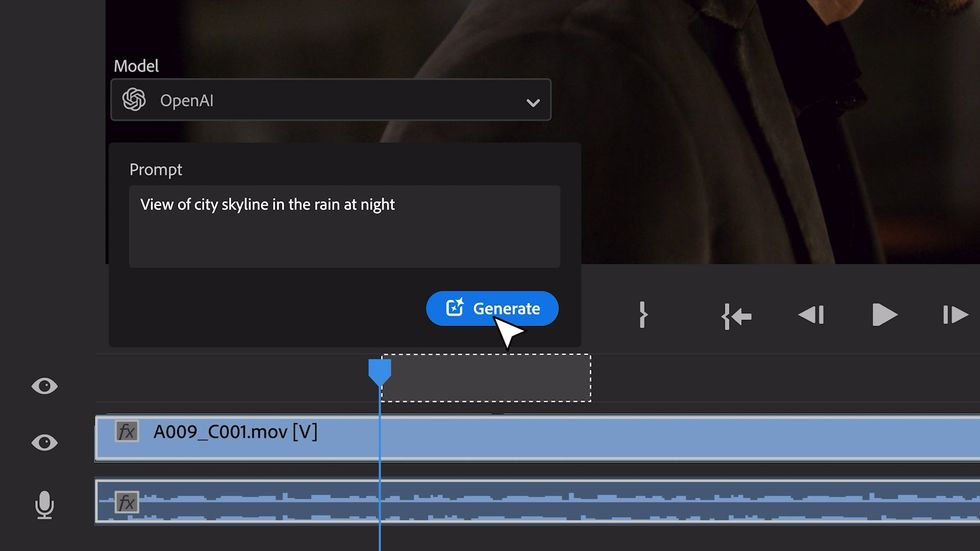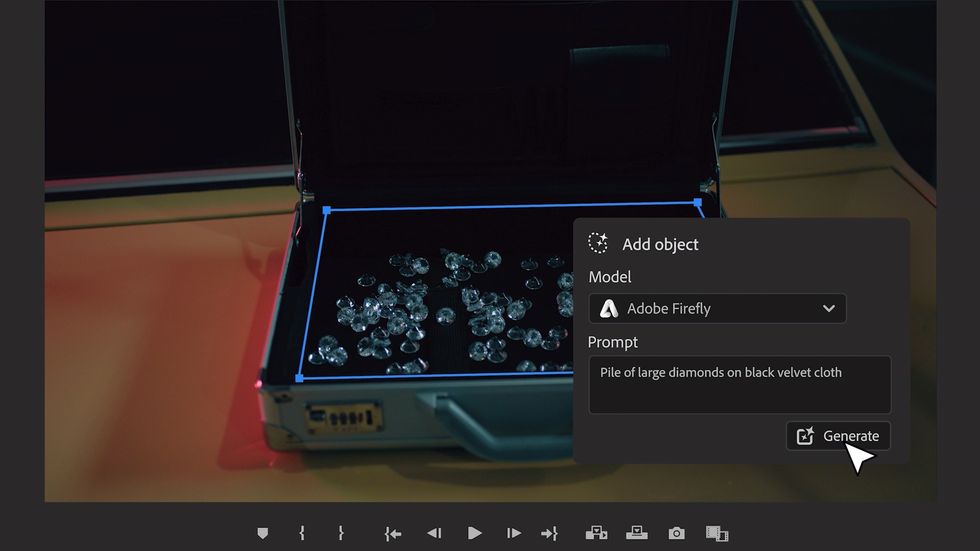BidSlate Puts Distribution Power Back in Filmmakers' Hands
"When you go the indie route, you have very limited choices. We decided, let's fix that."

As theatrical prospects dwindle and ticket sales decline, film distribution has been thrown into turmoil. Every year, sales and distribution companies reinvent themselves to counter deals from streaming services and the rising tides of self-distribution. But despite some innovation—day-and-date models have seen marginal success, for example—filmmakers, especially of the independent variety, are at a loss as to whom to sell their movies. When filmmakers hold their cards close, buyers have fewer movies to sell, and everyone loses.
BidSlate, a new marketplace for film sales, wants to empower both filmmakers and buyers. The online platform acts an intermediary between unsold movies and hungry distributors. But rather than aiming to replace the sales agent entirely (the traditional conduit), BidSlate works with agents and distributors to connect them to movies that may have gone unnoticed on the festival circuit—or didn't screen at a high-profile festival at all. BidSlate's model enables filmmakers to directly negotiate every element of their sale, targeting it specifically to the territories and platforms on which it will perform best.
No one can explain how BidSlate works better than its founder, Roland Rojas, a producer-turned-filmmaker-turned-entrepreneur who's intent on fixing the increasingly broken model of indie distribution. No Film School sat down with Rojas to find out why filmmakers and buyers alike need to know about BidSlate.
No Film School: What is BidSlate?
Roland Rojas: BidSlate is a B2B online marketplace for film sales. What we do is allow the buyer and the seller to directly negotiate and transact on our platform. We provide the technology for a seller to onboard his title and select what territories or rights he wants to sell. If he's represented in a certain part of the world but isn't in other parts, he can sell those other parts à la carte on our platform, and it doesn't impact his current deals or what he's already sold. If he has any holdbacks, he can put all that in the on-boarding process. A filmmaker on-boards his full feature, any poster art, any movie stills, all the metadata, what territories he's selling, what rights he's selling. If he wants to sell all of Italy for all rights, he can, but if he wants to sell VOD rights in Italy and retain all the other rights in Italy, he can do that, too. It's truly an à la carte menu of rights and territories that filmmakers can sell.
"Of the 4,000 films that are submitted to Sundance, less than 1% get accepted. Of the films that have gotten into Sundance, it's only another 20% that get deals. The other 80% are left without deals."
Once the publish button is hit on our platform, it's available for all verified buyers to see. We encrypt and watermark all intellectual property for its own protection. Only verified buyers and the author of the film can stream the title. No other filmmakers on our platform can see what other filmmakers have. We verify buyers, and once we do they have full access to our library, they can stream the trailers or the entire movie—although I don't know any buyers that watch a movie from beginning to end. They see what territories are available for sale. We have a fairly robust search engine where they can search by genre, territory available, right available, year made, [and] length. You name it—they can search it. Our search engine filters [according] to the buyer's specific purchasing needs.
Then, the buyer can contact the seller if he has a particular question. We have an internal messaging system that allows for the buyer to contact the seller, not the other way around. Once he decides he wants to purchase a film, the buyer puts in the criteria, length of the license, what he's buying for what territory, for what right, any deliverable assets that he needs, any legal terms he wants to add to the contract. Once all that is finished, he signs it electronically. We then generate a distribution agreement on the platform that is IFTA standard, but also that is dynamically significant to that particular transaction. We put all the information from that transaction into the agreement. Then it's sent off to the seller.

Rojas: The seller is notified by email that he's got a bid waiting for him on the BidSlate platform. He logs in, and he then can decide to accept it, reject it, or counter it. Assuming both parties agree, the seller signs it electronically as well, the bid goes into our escrow component. That protects the transaction. We insist on escrow being held, so if it's an NGE with an advance, we ask the advance be put in escrow. If it's a flat fee, we ask for the flat fee to be put in escrow. It's like buying a house. The seller knows he will get paid once he delivers the assets, and the buyers knows he's going to have his money returned if the assets aren't delivered. Once the assets are delivered to the buyer, he has a certain amount of time to accept what he's received. Once he accepts, the money is released to the seller, minus our fee.
"Don't hand off your film to someone who doesn't know about your passion, but just wants your marketing dollars. Go a new route."
That's pretty much the whole process from beginning to end. From a seller standpoint, and when I talk about à la carte, [it means that] a seller can go in any time he or she chooses to select what territories he wants to maintain on the platform or what rights he wants to sell or not sell. He retains the rights to the film at all times. He can decide, "I don't want to sell Europe on BidSlate anymore; I just want to sell Asia," or, "I want to add Latin America VOD rights." He has full control of what he's selling at all times.
NFS: In the event that a filmmaker is offered a deal at a festival, can she terminate a certain rights territory to get that deal?
Rojas: Yeah, but what we suggest for that event is for the buyer to go to BidSlate, register, and conduct a transaction through BidSlate, because we secure the transaction. If you go off our platform, your transaction isn't protected. There have been many times when a buyer, let's say, buys theatrical rights for a film in the Philippines. He then gets delivery of the assets but hasn't made payment to the seller. He takes the assets and starts exhibiting it in his country, making money off that film; on the other side of the equation, the seller is still waiting for his advance or his flat fee and hasn't received it. Meanwhile, the buyer has been making money off the film.
We protect the transaction on the platform, for everybody's security.

NFS: You want to be an intermediary between the seller and the buyer. Why do you think that this is necessary?
Rojas: For the longest time, sales agents have been the gatekeepers of the transactional process. They decide what films are sold and what films aren't. That creates a huge bottleneck in the independent film market. There are close to 50,000 pieces of content made every year globally in the independent realm. It's the largest and fastest-growing segment of the film industry, and it's the most cumbersome to transact in. If that bottleneck were removed, buyers would then have full access to much more content, especially if they are not at film festivals or markets.
We're trying to, as an intermediary, open up the spigot, so to speak, and give buyers as much access to as much content as possible to give them better choices. It's like going to a supermarket: you know what you want. Let's say you're going to buy toilet paper. You don't go to the ice cream aisle to look for toilet paper; you go to the toilet paper aisle. Then, in the toilet paper aisle, you've got a bunch of different brands. It's up to you to decide which one you want.
We want to give the choice back to the buyer of what type of content they want. They may be looking for drama for the Philippine market for VOD. We want to give them as many options as humanly possible.
We also want to give the filmmakers a level playing field as much as possible, not give preferential treatment to one film over another, and give the choice to the buyer as to which film he wants to purchase and give clarity to purchasing prices.
"There are close to 50,000 pieces of content made every year globally in the independent realm. It's the largest and fastest-growing segment of the film industry, and it's the most cumbersome to transact in."
We don't do bundling like most sales agents do, because bundling dilutes the value of any given film that's in that bundle. If you stand alone as a film, chances are you're going to improve your chances of being sold at the real price. The chances of your revenue stream dramatically increasing by market is heightened by selling à la carte as opposed to selling one region only—having Europe only sold as Europe, as opposed to breaking it up by rights within country.
Our message is to empower the filmmaker, to offer a level playing field for anyone that comes to our platform, filmmakers and buyers alike. A lot of buyers have been mistreated in the past by sales agents who have specific agendas in what they want to sell. Filmmakers have been neglected in that they are asked for ridiculous amounts of money after their film has finished for marketing fees that don't really go into marketing by sales agents. By doing what we're doing, we're hoping to educate filmmakers more. We're hoping to promote their films in an honorable and respectful way, where it gives them the best chance to get sold.
My business partner, Jesse, is a film producer. He's been one for 17 years, maybe produced 25 independent films. He's had to go the self-distribution route. He saw a broken model. I have some production understanding, as I have a production company myself, and I raise capital for other productions and advise them on their distribution strategy. I saw a broken model as well. When my business partner and I got together, we compared notes. We've been on the filmmaker side, we've been on the production side. It's not appealing for a filmmaker. When you go the indie route, you have very limited choices. We decided, let's fix that.

NFS: Are you doing any quality discretion, or would you encourage anybody with a film to apply?
Rojas: We don't curate. I compare it to walking into an antique store and seeing a TV or seeing a book. You may walk in and say, "I hate that book." I walk in right behind you, I look at the same book, and that's the book I've been looking for forever.
We give the empowerment to the buyer to select what he wants to see. He knows his market better than I do; I don't claim to know the Italian market as well as an Italian buyer would. All we ask is that it's obviously production quality, and we ask filmmakers to be aware that a buyer may ask for a title change based on the country or certain things, like subtitling or for a certain scene to be removed. Of course, no pornography.
NFS: Why would you encourage a filmmaker to go your route rather than doing their own direct-to-audience distribution?
Rojas: There are many direct-to-audience distribution platforms, but frankly, if you target the eyeballs instead of the person that will get it to as many eyeballs as possible, you're doing yourself a disservice. You can go that route, but it's going to be a long, arduous path. Whereas if you go to a buyer of a particular platform, he knows how best to position your film to get it to the most eyeballs. Plus, it's 99 cents, versus potentially thousands of dollars in one transaction. You increase your revenue chances dealing with a distributor or a buyer as opposed to individual eyeballs.
"If you target the eyeballs instead of the person that will get it to as many eyeballs as possible, you're doing yourself a disservice. You increase your revenue chances dealing with a distributor or a buyer."
NFS: So, in essence, you don't want to disband with the traditional model entirely. You just want to better adapt it to the needs of modern buyers and filmmakers in the marketplace.
Rojas: We don't charge a membership fee; we don't charge filmmakers on-boarding fees; we don't charge storage fees; we don't charge marketing fees.
The only way we get paid is with a successful transaction. There's no cost, unlike a typical sales agent. Not only do they take the rights away from the filmmaker for five to 10 years, but a lot of them charge upfront marketing fees to filmmakers. We don't do that.
We're present in all the film markets globally, but we don't charge the filmmaker. It might come down the road that we offer a premium service, but for the moment, we don't charge at all for anything other than a successful transaction. Given the A to Z solution that we offer, our commission fee of 20%, which we feel is reasonable.
NFS: What opportunities would a short film have on BidSlate?
Rojas: We have short film content on our platform. We have feature films, we have short films, and we have series. Shorts are hard to sell, but there are markets, primarily from the educational buyers. We had some transactions come through from universities in the US, from cable companies that want to conglomerate and do a two-hour genre-specific short fest. Also, airlines love shorts. If for instance, we had a filmmaker that had 20 short films in different genres, we suggest that filmmaker group the short films together for similar genres and put those for sale as a group as opposed to selling individually. That draws more attention to anyone looking for a particular genre.
If you have one short film, put it on the platform and we'll try and push it to the educational market or the cable companies that we know are looking for short content, or for the OTT platforms that have short content platforms.

Rojas: With our ability in the near future to offer direct digital delivery, we'll be able to offer access to all the VOD platforms, if the seller is willing to pay for that. It does cost to get [the film] transcoded into whatever specs the VOD platform requires and then have it QC'd, but we'll offer that.
On our platform, a filmmaker can list whatever festivals their film has been in, what awards it's won, what press it's received. All that metadata goes into our platform. If it's gotten into any festival, it has more appeal. If it's won any awards at any of those festivals, it garners more appeal from buyers because then it's recognized; it obviously has some content that is reachable to people. So, the more festivals it's been in—regardless of whether it's a second- or third-tier festival—the more marketing appeal it could potentially have.
We reach out to as many buyers for any film that comes on board as we humanly can. We have access to about 3,500 buyers globally. There may be 4,200 in the world, so we're pretty close to getting the full list. It changes, obviously, so we're never going to hit exactly the right amount. We always target our reach to the buyers with specifics. We don't try and blanket them with things they don't want.
"While you're on the film festival circuit, you could also have your film on BidSlate, and we'll be doing the marketing for you. While you're at Sundance, we'll be in Berlin trying to sell your film to buyers."
If we have a documentary on the deforestation problem in Madagascar, which we do, we'll reach out to buyers of documentaries. We'll reach out to buyers that are interested in the human condition, or a telling story. We'll reach out to buyers that are interested in human rights and the environment. We'll also reach out to buyers in the market that that film is available in. It's a very targeted approach. We also will say, "Look, this film has been in the Madagascar Film Festival. It won the award for most influential X." We make sure we point that out.
Obviously, when we have 4,000 films, we won't be doing the individual approach. By then, hopefully, buyers will know who BidSlate is, and the marketing happens on its own. We'll be marketing the platform, and what's new on the platform. People will be coming in and buying it. When eBay first came out, it didn't promote or market the toilet plunger that it just got in the marketplace; it promotes the platform. After a certain while, we'll have to promote the platform, and the latest offerings that we have. It will happen more blanketed down the road. For right now, we're being very specific to draw the attention of as many buyers as we possibly can.

NFS: I was just talking to the director of a film that was at Sundance this past year. It got pretty good reviews from the festival, and it even won an award. But they didn't get a deal out of Sundance. They got a couple offers, but they were not attractive.
Rojas: That's exactly the thing. Assuming you go to film school, a lot of filmmakers who are in the early stages of filmmaking are [using] the old model. Now, I'm not trying to counter film festivals because I think film festivals are important. They get the word out. It obviously helps the film gain recognition. But film festivals are not a guarantee for sales. If you get into Sundance—and your friend is the perfect example—it doesn't mean you're going to get a deal. I have research that states that of the 4,000 films that are submitted to Sundance, less than 1% get accepted. You already beat the odds by getting into Sundance. It's like winning the lottery.
Of the films that have gotten into Sundance, it's another 20% that get deals. The other 80% are left without deals. Just because you are in a high-profile festival, doesn't mean you're going to get every deal coming your way. My main message to filmmakers that offer me this counter argument that, "Oh, well I need to be in film festivals. I need to do the film festival circuit." Yeah, that's great, but while you're on the film festival circuit, you could also have your film on BidSlate, and we'll be doing the marketing for you. While you're at Sundance, we'll be in Berlin trying to sell your film to buyers that aren't at Sundance.
A film has a life of anywhere between 18 and 24 months after it's finished. If you do the film festival route for a year, and you wait to start getting your film sold because you want to do the film festival route, you've already lost 12 months of the 18 to 24. Now you've got no momentum. You've lost a year. You could have been trying to sell your film for a year.
It's an education process for filmmakers. They have this mindset that people have told them, "You have to do it this way." You don't. The industry is broken. You have to realize that it's broken, and you have to do it a new way.
NFS: You have to adapt.
Rojas: Yeah, you have to adapt and develop the new synapses in your brain that have you thinking differently. The definition of insanity is expecting a different outcome for the same actions. If you're going the way of the lemming, and that way isn't working, be a trailblazer and do something else different. You took the risk in devoting four or however many years in making this film. Why not continue the risk in taking control of the transaction? Don't hand off your film to someone who doesn't know about your passion, or couldn't care less about your film, but just wants your marketing dollars. Go a new route.














